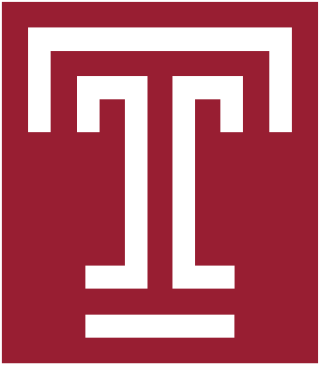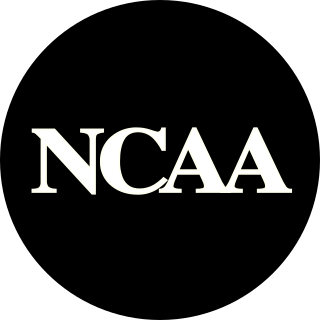
The NCAA Division I men's basketball tournament, branded as March Madness, is a single-elimination tournament played in the United States to determine the men's college basketball national champion of the Division I level in the National Collegiate Athletic Association (NCAA). Played mostly during March, the tournament consists of 68 teams and was first conducted in 1939. Known for its upsets of favored teams, it has become one of the biggest annual sporting events in the US.

Luigi "Geno" Auriemma is an American basketball coach who is the head coach of the UConn Huskies women's basketball team. He holds the record for most wins (1,229) and highest winning percentage (.882) among college coaches with a minimum of 10 seasons, any level, men's or women's. Since becoming head coach in 1985, he has led UConn to 17 undefeated conference seasons, of which six were undefeated overall seasons, with 11 NCAA Division I national championships, the most in women's college basketball history, and has won eight national Naismith College Coach of the Year awards. Auriemma was the head coach of the United States women's national basketball team from 2009 through 2016, during which time his teams won the 2010 and 2014 World Championships, and gold medals at the 2012 and 2016 Summer Olympics, going undefeated in all four tournaments. Auriemma was inducted into the Naismith Memorial Basketball Hall of Fame and the Women's Basketball Hall of Fame in 2006.

Roy Allen Williams is an American retired college basketball coach who served as the men's head coach for the North Carolina Tar Heels for 18 seasons and the Kansas Jayhawks for 15 seasons. He was inducted into the College Basketball Hall of Fame in 2006 and the Basketball Hall of Fame in 2007.

Jerold Taylor "Jay" Wright Jr. is a former American college basketball coach. He served as the head coach of Villanova University from 2001 until 2022. Wright led the Villanova Wildcats to six Big East Conference championships and 16 NCAA tournament appearances in 21 seasons as head coach. Under Wright, Villanova reached four Final Fours and won two national championships in 2016 and 2018.

The UConn Huskies are the intercollegiate athletic teams that represent the University of Connecticut, with its main campus located in Storrs, Connecticut. The school is a member of the NCAA's Division I and the Big East Conference.

The Duke Blue Devils men's basketball team represents Duke University in NCAA Division I college basketball and competes in the Atlantic Coast Conference (ACC). The team is fourth all-time in wins of any NCAA men's basketball program, and is currently coached by Jon Scheyer.

The North Carolina Tar Heels men's basketball program is a college basketball team of the University of North Carolina at Chapel Hill. The Tar Heels have won six NCAA championships in addition to a 1924 Helms Athletic Foundation title (retroactive). North Carolina has won a record 133 NCAA tournament matchups while advancing to 31 Sweet Sixteen berths, a record 21 Final Fours, and 12 title games. It is the only school to have an active streak of reaching the National Championship game for nine straight decades and at least two Final Fours for six straight decades, all while averaging more wins per season played (20.7) than any other program in college basketball. In 2012, ESPN ranked North Carolina No. 1 on its list of the 50 most successful programs of the past fifty years.

The Villanova Wildcats men's basketball program represent Villanova University in men's college basketball and competes in the Big East Conference of NCAA Division I. Their first season was the 1920–21 season. Named the Wildcats, Villanova is a member of the Philadelphia Big Five, five Philadelphia college basketball teams who share a passionate rivalry.

The Temple Owls men's basketball team represents Temple University in the sport of basketball. The Owls compete in National Collegiate Athletic Association (NCAA) Division I as a member of the American Athletic Conference. They play their home games in the Liacouras Center on the university's main campus in Philadelphia, Pennsylvania, and are currently led by head coach Adam Fisher. Temple is the sixth-most winningest NCAA Division I men's college basketball program of all time, with 2,000 wins. Although they have reached the NCAA Tournament over thirty times, they are one of nine programs with that many appearances to have not won the Tournament and one of four to have never reached the National Championship Game.
The UConn Huskies men's basketball program is the NCAA Division I men's college basketball team of the University of Connecticut in Storrs, Connecticut. They currently play in the Big East Conference and are coached by Dan Hurley. With six national championships and 45 conference titles, the program is considered one of the blue bloods of college basketball.
The UConn Huskies women's basketball team is the college basketball program representing the University of Connecticut in Storrs, Connecticut, in NCAA Division I women's basketball competition. They currently play in the Big East Conference.

The Big East Conference is a collegiate athletic conference that competes in NCAA Division I in 10 men's sports and 12 women's sports. Headquartered in New York City, the 11 full-member schools are primarily located in Northeast and Midwest metropolitan areas. The conference was officially recognized as a Division I multi-sport conference on August 1, 2013, and since then conference members have won NCAA national championships in men's basketball, women's cross country, field hockey, men's lacrosse, and men's soccer. Val Ackerman is the commissioner.

The 2016 NCAA Division I men's basketball tournament involved 68 teams playing in a single-elimination tournament to determine the men's National Collegiate Athletic Association (NCAA) Division I college basketball national champion for the 2015–16 season. The 78th edition of the Tournament began on March 15, 2016, and concluded with the championship game on April 4, at NRG Stadium in Houston, Texas. This was the first NCAA tournament to adopt the NCAA March Madness branding, including fully-branded courts at each of the tournament venues.

The 1999 NCAA Division I men's basketball championship game was the finals of the 1999 NCAA Division I men's basketball tournament and it determined the national champion for the 1998-99 NCAA Division I men's basketball season The game was played on March 29, 1999, at Tropicana Field in St. Petersburg, Florida and featured the East Regional Champion, #1-seeded Duke against the West Regional Champion, #1-seeded Connecticut.

The 2016 NCAA Division I men's basketball championship game was the final game of the 2016 NCAA Division I men's basketball tournament and determined the national champion for the 2015–16 NCAA Division I men's basketball season. The game was played on Monday, April 4, 2016, at NRG Stadium in Houston, Texas, between the Villanova Wildcats and the North Carolina Tar Heels.

The 2022 NCAA Division I men's basketball tournament involved 68 teams playing in a single-elimination tournament that determined the National Collegiate Athletic Association (NCAA) Division I men's college basketball national champion for the 2021–22 season. The 83rd annual edition of the tournament began on March 15, 2022, and concluded with the championship game on April 4 at the Caesars Superdome in New Orleans, Louisiana, with the Kansas Jayhawks defeating the North Carolina Tar Heels, 72–69, overcoming a 16-point first-half deficit, to claim the school's fourth national title.

The 2021–22 North Carolina Tar Heels men's basketball team represented the University of North Carolina at Chapel Hill during the 2021–22 NCAA Division I men's basketball season. The team was coached by Hubert Davis, in his first season as UNC's head coach after the retirement of longtime coach Roy Williams. The Tar Heels played their home games at the Dean Smith Center in Chapel Hill, North Carolina, as members of the Atlantic Coast Conference.

The championship game of the 2022 NCAA Division I men's basketball tournament was contested on April 4, 2022, at the Caesars Superdome in New Orleans, Louisiana. The game featured the Kansas Jayhawks of the Big 12 Conference and the North Carolina Tar Heels of the Atlantic Coast Conference. This was a rematch of the 1957 national championship game, in which undefeated North Carolina defeated Kansas by a 54–53 score in triple-overtime to win their first-ever national championship.

The 2023 NCAA Division I women's basketball tournament was a single-elimination tournament of 68 teams to determine the National Collegiate Athletic Association (NCAA) Division I college basketball national champion for the 2022–23 NCAA Division I women's basketball season. The 41st edition of the tournament began on March 15, 2023, and concluded on April 2 with the championship game at the American Airlines Center in Dallas.
















